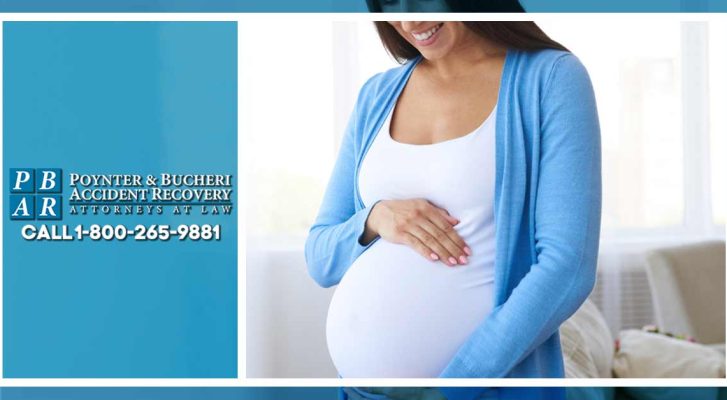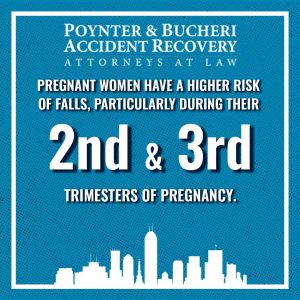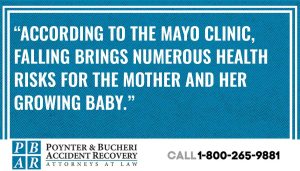
Falling While Pregnant: Slip and Fall Accidents

For an expecting mother-to-be, falling while pregnant is a scary situation. Even a minor fall can cause significant slip and fall injuries to the mother and baby.
Did you slip and fall while pregnant? Below, Poynter & Bucheri Accident Recovery presents some of the most common questions about falling during pregnancy and what to watch for after falling while pregnant.
What Are the Most Common Causes of Falling While Pregnant?

Pregnant women have a higher risk of falls, particularly during their second and third trimesters of pregnancy. When an obstacle is in the woman’s path, or the ground is rough, she may struggle to handle the challenging terrain without falling.
During pregnancy, a woman’s balance is less stable than usual. Pregnancy causes the body’s center of mass to shift up and forward due to the enlargement of the uterus and the weight of the baby.
Common causes of falls during pregnancy include:
- Wet and slippery floors
- Uneven flooring and pavement
- Worn, loose, and rough flooring materials
- Flaps in carpeting
- Rugs skidding across the floor
- Potholes in parking lots
- Cluttered areas in homes, stores, and buildings
- Unsafe and poorly lit stairways and walkways
- Missing handrails
Falling accidents may also occur when pregnant women are knocked down in dog attacks, pedestrian accidents, and other personal injury accidents involving unexpected strikes. Any injury during pregnancy should receive immediate medical attention from a qualified healthcare professional.
What Are My Health Risks From Falling During Pregnancy?

According to the Mayo Clinic, falling brings numerous health risks for the mother and her growing baby. Here’s what to watch for after falling during pregnancy.
Premature Contractions
A blow to the belly or body can cause sudden contractions during pregnancy, leading to premature labor or birth. Preterm birth has a strong connection to a variety of adverse health consequences in newborns, including developmental delays, breathing problems, vision/hearing problems, and a greater risk of developing Cerebral Palsy.
Loss of Amniotic Fluid
If a woman falls and lands on her pregnant belly, the pressure could cause a loss of protective amniotic fluid. Also known as oligohydramnios, low/lost amniotic fluid can cause infections, preterm birth, miscarriage, and stillbirth. Babies born after the mother experiences low amniotic fluid are at an increased risk of birth deformities, underdeveloped lungs and organs, respiratory issues, and a need for Cesarean or early delivery.
Placental Abruption
A placental abruption occurs when the placenta tears from the wall of the mother’s uterus. After a placental abruption, the baby can no longer absorb adequate oxygen and nutrients. The mother may experience heavy bleeding, and early delivery could be required.
Fetomaternal Hemorrhage
A fall during pregnancy can cause internal bleeding where fetal blood cells enter the mother’s bloodstream. This is known as a fetomaternal hemorrhage and raises the risk of fetal death, maternal death, stillbirth, miscarriage, brain damage, and other severe risks.
Other Slip-Related Risks
Pregnant mothers are also vulnerable to other common fall injuries, like bruises, lacerations, fractures, hip injuries, spinal injuries, back injuries, concussions, and traumatic brain injuries.
Who Is Liable if I Slip and Fall While Pregnant?
Liability for a slip and fall accident during pregnancy depends on where the accident occurred, how it happened, who owns the property, and other factors. The injured mother can seek compensation from a liable property owner who was aware of a hazard and allowed unsafe conditions to persist.
In Indiana, property owners are not permitted to allow dangerous conditions to continue without attempting to fix the issue or provide adequate warning. Otherwise, they can be held liable for an injured person’s losses, including medical costs, lost earnings, and other damages.
Who is responsible for your slip and fall while pregnant? It could be:
- The property owner
- The leasing company or landlord
- Your employer
- A company contractor
- A retail outlet
- A government organization
- Another liable party
If you’re not sure who may be liable for your slip-and-fall, speak to a local personal injury attorney as soon as possible after receiving treatment for your injuries.
What Should I Do After Falling While Pregnant?
Slip-and-fall accidents are extremely risky for pregnant mothers, so an immediate medical evaluation is a must. See your doctor and describe the accident so you can receive treatment and establish a baseline for your personal injury case.
Here are the most critical steps you should take after a fall during your pregnancy:
- Seek medical care immediately.
- Follow your doctor’s orders and save all bills and paperwork.
- Document the scene of the accident with photos, videos, and notes.
- Get the contact information for any witnesses.
- Notify the property owner about your injuries.
- Explain that you’ll be seeking legal input for your slip and fall injuries and direct inquiries to your lawyer.
Slip and Fall While Pregnant? Contact Poynter & Bucheri Accident Recovery
If you were injured in a slip-and-fall accident during pregnancy, we can help you evaluate your options and provide support as you determine your next steps. We’re here to assist you during this challenging time in your pregnancy. Request a free case review by calling Poynter & Bucheri Accident Recovery at 1-800-265-9881.
